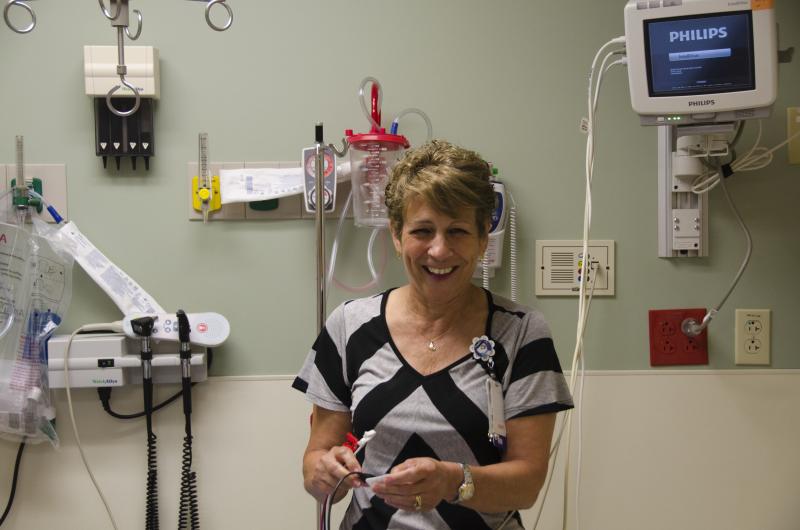Rochester nurse celebrates 45 years in the ER
Forty-five years in the emergency room isn’t bad when you consider that Cindy Ziewacz was deemed “too small” to be a nurse and never had a job interview.
A Rochester resident, Ziewacz grew up in Fairhaven. As she prepared for graduation, one of her guidance counselors told her she was too petite to be a nurse.
“They said…you’ll never make it,” said Ziewacz. Another teacher told her she would probably become a secretary and get married.
Undeterred, Ziewacz enrolled at St. Luke’s School of Nursing in New Bedford and took a job at the hospital after graduation. A few months later, she was recommended for an opening in the emergency room.
“I haven’t left,” said Ziewacz. “I never had any ER training. I kind of learned by the seat of my pants.”
Now, as the most senior registered nurse in her department, Ziewacz has seen thousands of patients go through the fast-paced emergency room.
“To work in the emergency room, you have to be very organized, think outside the box because not everything is black and white, have good assessment skills, be a team player,” explained Ziewacz.
Those skills came into play in 2009 when an unknown chemical spilled at ABC Disposal Services in New Bedford.
As more than 100 people streamed into the ER, the nurse’s recently developed emergency management plan was put to the test. Ziewacz manned the decontamination area, but worried that the untested plan wouldn’t actually work.
But she said, “It was so natural. Everybody fell into place.”
The nurse’s emergency management plan is one of several programs she’s developed for the ER. Ziewacz also created a domestic violence program for her department and a drug substance abuse program for schools.
This year will be her 25th organizing the hospital’s first aid and water stations for the New Bedford Half Marathon, which includes finding at least 100 volunteers. Some of Ziewacz’s helpers are the grandchildren of her original volunteers, she said.
For many of her efforts, Ziewacz and/or her programs have received the President’s Award at the hospital as well as recognition from city and state leaders.
But the story Ziewacz often tells is about a young girl who came into the ER early in her career.
The child’s illness required transportation to Boston. “I had to go in the back of the ambulance with the child. [After that,] I never heard anything else,” she said.
A few years later, Ziewacz befriended one of the girl’s family members and found out she had made a full recovery. She even wrote a note to the girl when she graduated from high school.
“I said: Every nurse has a story in their profession, and you are my story to remember forever,” recalled Ziewacz.
Years later, Ziewacz was called to the maternity wing to see her former patient’s new baby. “I will never ever forget,” she said.
Memories like these have helped Ziewacz get through 45 years of emergencies and transition.
Technology is one big change, she said.
“If you leave the profession for six weeks, eight weeks, you’re already going to come back and have to learn something new,” Ziewacz said.
Additionally, socio-economic changes have made it more difficult to treat people than in the past.
Since many in the community cannot afford healthcare, Ziewacz said, “Sometimes they come back to the ER sicker than when they first came in. It’s tough.”
And while she said her life was never threatened, she has received verbal abuse.
“It’s part of society now,” said Ziewacz. “We’re a lockdown unit. We weren’t when I started. You have to – it’s reality.”
Ziewacz takes out her stress on the quiet streets of Rochester. “When I come home and I’m frustrated, I walk. That’s my outlet.”
But if she didn’t love it, Ziewacz would have quit long ago.
“It’s nice when people sometimes just say thank you. I love that,” she said. Ziewacz added, “I love seeing the younger nurses grow up and be where I am right now.”
As the 64-year-old nurse considers retiring – her sons are grown-up and her first grandchild is on the way – she doesn’t envision the rest of her life in a rocking chair.
“One of the things that is nice about working in the emergency room is you meet a lot of people in the community,” Ziewacz said. “When I retire, I’m still going to be involved in the community somehow.”















